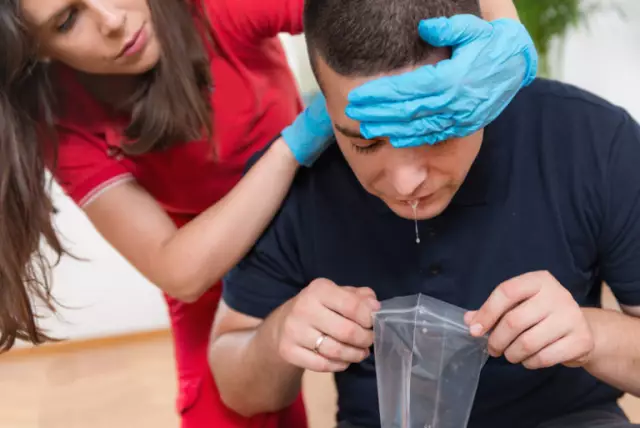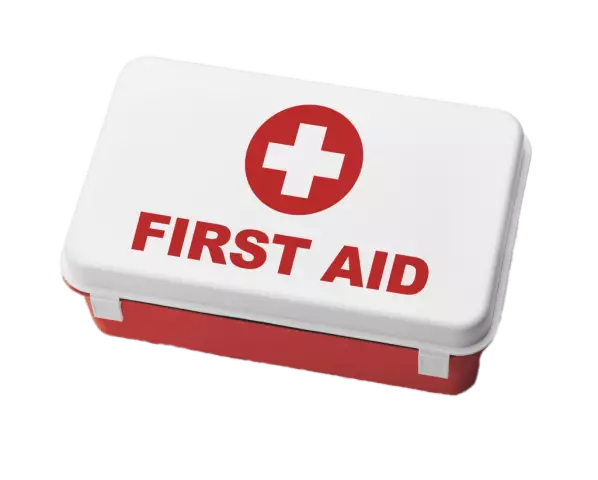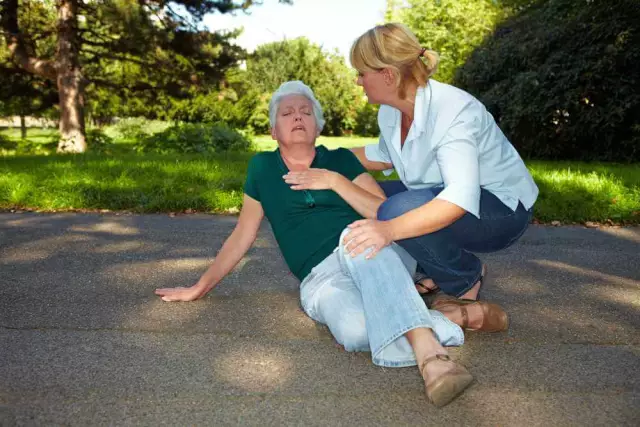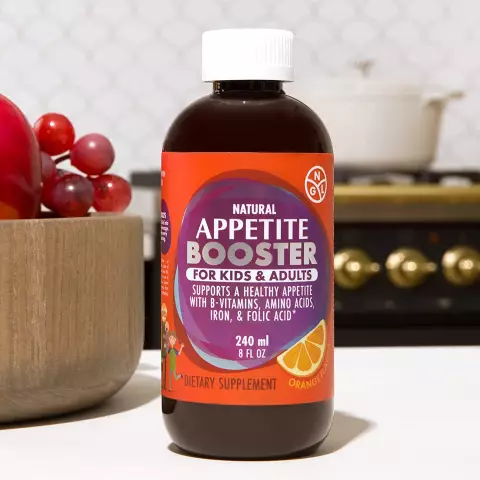- Author Rachel Wainwright wainwright@abchealthonline.com.
- Public 2023-12-15 07:39.
- Last modified 2025-11-02 20:14.
First aid for poisoning

Poisoning is called systemic damage to the body due to the ingestion of poisonous substances. The poison can enter the body through the mouth, respiratory tract, or skin. There are the following types of poisoning:
- Food poisoning;
- Mushroom poisoning (allocated in a separate group, since they differ from ordinary food poisoning);
- Poisoning with drugs;
- Poisoning with poisonous chemicals (acids, alkalis, household chemicals, refined products);
- Alcohol poisoning;
- Poisoning by carbon monoxide, smoke, ammonia vapors, etc.
In case of poisoning, all functions of the body suffer, but the activity of the nervous, digestive and respiratory systems suffers most. The consequences of poisoning can be very serious, in severe cases, dysfunction of vital organs can lead to death, and therefore first aid for poisoning is extremely important, and sometimes a person's life depends on how timely and correctly it is provided.
General rules for first aid in case of poisoning
The principles of providing emergency assistance are as follows:
- Stop contact with the poisonous substance;
- Remove the poison from the body as soon as possible;
- Support the vital functions of the body, primarily respiratory and cardiac activity. If necessary, carry out resuscitation measures (closed heart massage, mouth-to-mouth breathing or mouth-to-nose breathing);
- Call a doctor for the injured person, in urgent cases - an ambulance.
It is important to establish exactly what caused the poisoning, this will help you quickly navigate the situation and effectively provide assistance.
Food poisoning
Food poisoning is what one has to deal with most often in everyday life, perhaps there is not a single adult who has not experienced this condition on himself. The cause of food poisoning is the ingestion of poor-quality food products, as a rule, we are talking about their bacterial infection.
Food poisoning symptoms usually develop within an hour or two after eating. These are nausea, vomiting, diarrhea, abdominal pain, headache. In severe cases, vomiting and diarrhea become intense and repeated, and general weakness appears.
First aid for food poisoning is as follows:
- Make a gastric lavage. To do this, give the victim to drink at least one liter of water or a pale pink solution of potassium permanganate, then induce vomiting by pressing with two fingers on the root of the tongue. This must be done several times, until the vomit consists of one liquid, without impurities;
- Give the victim an adsorbent. The most common and inexpensive is activated carbon. It should be taken at the rate of 1 tablet for every 10 kg of weight, so a person weighing 60 kg needs to take 6 tablets at once. In addition to activated carbon, suitable: Polyphepan, Lignin, Diosmektit, Sorbeks, Enterosgel, Smecta, etc.;
- If there is no diarrhea, which is rare, you should artificially induce bowel movement, this can be done with an enema or by taking a saline laxative (magnesia, Carlsbad salt, etc. will do);
- Warm up the victim - put it down, wrap it with a blanket, give warm tea, you can put a heating pad on your feet;
- Replenish the loss of fluid by giving the patient an abundant drink - lightly salted water, unsweetened tea.
Mushroom poisoning
First aid for mushroom poisoning differs from help for ordinary food poisoning in that the victim must be examined by a doctor, even if the symptoms of poisoning at first glance seem insignificant. The reason is that mushroom poison can cause serious damage to the nervous system, which does not appear immediately. However, if you wait for the onset of symptoms, help may not arrive on time.
Poisoning with drugs
If drug poisoning occurs, you must immediately call a doctor, and before his arrival, it is advisable to find out what the victim took and in what quantity. Symptoms of drug poisoning manifest themselves in different ways depending on the action of the drug that caused the poisoning. Most often it is a lethargic or unconscious state, vomiting, lethargy, drooling, chills, pallor of the skin, convulsions, and strange behavior.
If the victim is conscious, while awaiting the arrival of the doctor, it is necessary to carry out the same emergency measures as in case of food poisoning. The unconscious patient should be laid on his side so that when vomiting opens, he does not choke with vomit, keep the pulse and respiration under control, and in case of their weakening, start resuscitation measures.
Poisoning with acids and alkalis
Concentrated acids and alkalis are strong poisons that, in addition to toxic effects, also cause burns at the point of contact. Since poisoning occurs when acid or alkali enters the body through the mouth, one of its symptoms is burns to the mouth and throat, and sometimes lips. First aid for poisoning with such substances includes washing the stomach with clean water, contrary to popular belief, you do not need to try to inactivate the acid with alkali, and you should not induce vomiting without washing. After washing the stomach in case of acid poisoning, you can give the victim milk or a little vegetable oil to drink.
Poisoning by volatile substances
Poisoning resulting from the inhalation of toxic substances is considered one of the most severe types of intoxication, since the respiratory system is directly involved in the process, therefore, not only breathing suffers, but also toxic substances quickly penetrate the bloodstream, causing damage to the entire body. Thus, the threat in this case is double - intoxication plus a violation of the breathing process. Therefore, the most important first aid measure for poisoning with volatile substances is to provide the victim with clean air.
A person in consciousness must be taken out into clean air, loose tight clothes. If possible, rinse your mouth and throat with a solution of soda (1 tablespoon per glass of water). In the event that there is no consciousness, the victim should be laid with his head raised and the flow of air should be ensured. It is necessary to check the pulse and breathing, and in case of their violation, to carry out resuscitation measures until the stabilization of cardiac and respiratory activity or before the arrival of an ambulance.
Errors in first aid for poisoning
Some measures taken as emergency help for poisoning, instead of relieving the victim's condition, can cause additional harm. Therefore, you should be aware of common mistakes and not commit them.
So, when providing emergency assistance for poisoning, you should not:
- Give sparkling water to drink;
- Induce vomiting in pregnant women, in unconscious victims, in the presence of seizures;
- Try to give an antidote on your own (for example, neutralize the acid with alkali);
- Give laxatives for poisoning with acids, alkalis, household chemicals and petroleum products.
For all types of poisoning, you must call an ambulance, because almost always, in case of poisoning, hospitalization is required. The only exceptions are mild cases of food poisoning, which can be treated at home.
Found a mistake in the text? Select it and press Ctrl + Enter.






